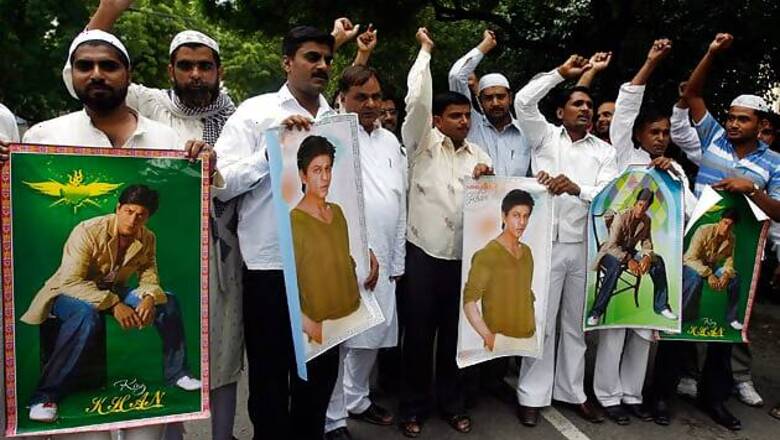
views
New Delhi: "We take comfort in defining phenomena, objects and people - with a limited amount of knowledge and along known parameters." No words define the deep irony of Shah Rukh Khan's fervent interview in the Outlook Turning Points magazine as these do.
Although Khan did not exclusively speak of his experience of living in India as a Muslim (it's a reference among other things), as soon as excerpts from 'Being a Khan' were available to readers, impatient outrage from both sides of the fence poured in - even from those who had not yet read the article.
'To slight Khan, is to slight us' was the predictable and primary defense of the star's fans on social media, attacking anyone attempting to dissect the opinion he expressed in the write up. Khan is right on that count at least. We love to condemn. Condemning without understanding is infinitely more convenient than tackling logic.
So what exactly does Shah Rukh Khan say in the article?
Part flippant, part tongue-in-cheek, Khan wields his bravado like a shield to cover a subject which he probably understands can upset the applecart his stardom rests on. He says he is raising two intelligent and perceptive children in the secular cocoon of his home. He's married a Hindu and wears his secularism like a badge of honour.
Yet, when he explains his religious bearings in 21st century India, he resorts to a cliche he himself pans repeatedly: "It is the box that contains an image of my religion in millions of minds. I encounter this tightening of definition every time moderation is required to be publicly expressed by the Muslim community in my country."
"I am a Khan," he says. "The name itself conjures multiple images in my mind too: a strapping man riding a horse, his reckless hair flowing from beneath a turban tied firm around his head. His ruggedly handsome face marked by weathered lines and a distinctly large nose," a nose Khan jokes announces his arrival, peeking through the doorway just before he makes his "megastar entrance."
Khan says in the article he sometimes becomes "the inadvertent object of political leaders" who choose to make him "a symbol of all that they think is wrong and unpatriotic about Muslims in India". He obliquely refers to the protests some of his films have drawn from extreme right wing politicians and their gang of troublemakers.
"There have been occasions when I have been accused of bearing allegiance to our neighbouring nation rather than my own country - this even though I am an Indian whose father fought for the freedom of India. Rallies have been held where leaders have exhorted me to leave my home and return to what they refer to as my 'original homeland'," he says.
If what Khan says is to be taken at face value, India hasn't progressed much since Muhammad Yousuf Khan felt the imperative to change his name to Dilip Kumar to survive in the predominantly Hindu film industry. Does it matter to his fans that he's a Muslim? Khan attributes his success to the millions that have catapulted him to the hysteric-screaming-writing-his-name-in-blood heights of fame but complains plaintively that his religion is only a reminder away in a post 9/11 world.
Naming his son and daughter Aryan and Suhana is part of an attempt to blend in.
"I gave my son and daughter names that could pass for generic (pan-Indian and pan-religious) ones: Aryan and Suhana. The Khan has been bequeathed by me so they can't really escape it. I pronounce it from my epiglottis when asked by Muslims and throw the Aryan as evidence of their race when non-Muslims enquire," he says.
"I imagine this will prevent my offspring from receiving unwarranted eviction orders and random fatwas in the future. It will also keep two children completely confused. Sometimes, they ask me what religion they belong to and, like a good Hindi movie hero, I roll my eyes up to the sky and declare philosophically, "You are an Indian first, and your religion is humanity", or sing them an old Hindi film ditty 'Tu Hindu banega na Musalmaan banega - insaan ki aulad hai insaan banega' set to Gangnam Style," he says in his characteristic droll humour.
Khan says whenever there is an act of violence in the name of Islam, he is called upon to air his views on it and dispel the notion that by virtue of being a Muslim he condones such senseless brutality. He made a film (My Name is Khan) "just to prove a point".
Consider our Muslim luminaries - the ones we look up to as India's brand ambassadors of cinema - Shabana Azmi, Dilip Kumar, Javed Akhtar, Naseeruddin Shah, Aamir Khan, Salman Khan, Saif Ali Khan, Shah Rukh Khan, Madhubala, Suraiya, Waheeda Rehman, AR Rahman, Mohammad Rafi - to name a few - do their religion cloud our appreciation of what they have contributed to our cinema? Perhaps not. Yet each one of them must have, at some point or other in their lives felt bias, hatred and prejudice as religious minorities - of any religion - are sometimes made to feel at their rightful home.
That is unavoidable. How they deal with it defines their attitude to life and religion. Some chose to remain silent, some write lengthy newspaper articles, some hold press conferences, some take it on their chin and move on and some fester a grudge.
Khan chose the platform of media to air his grievances. He is entitled to it. As are his critics to condemn that viewpoint. But it's amusing how Khan, who's a pro at manipulating the media to his own advantage, has created a talking point even while seeming to defend his stardom against bigots.
For example, the time he said he was "interrogated at an airport for hours about his last name", his detractors criticized the mileage he created for his film 'My Name is Khan', conveniently, on the same subject. But an unapologetic Khan stresses that his religion was never a sensitive problem for him or the people he shields from bigoted attack.
"So I am a Khan, but no stereotyped image is factored into my idea of who I am. Instead, the living of my life has enabled me to be deeply touched by the love of millions of Indians," he says.
The only sympathy that Khan, as an entertainer, deserves should be decided on the Friday his movie hits theatres. Who cares whether he practices Islam, Hinduism or Buddhism? He writes well, we give him that. He is articulate and extraordinarily witty, though admittedly whining doesn't suit his arms-stretched-wide image.
Whether Khan is being candid in his confession or not, none can deny his skill at bouncing right back into the arc light. As he has. Again.




















Comments
0 comment